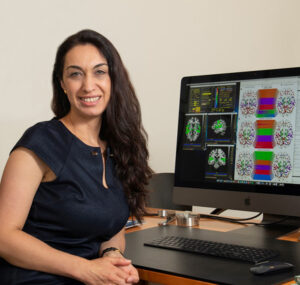Dystonia Researcher Awarded $11.9 Million NIH Grant to Lead New Center for Neurological Voice Disorders

DMRF extends congratulations to Kristina Simonyan, MD, PhD, Dr med, Director of laryngology research at Mass Eye and Ear, for being awarded an $11.9 million P50 Clinical Research Center Grant from the National Institute on Deafness and Other Communicable Disorders (NIDCD) of the National Institute of Health (NIH) to form a new multidisciplinary center across four academic medical institutions that will be committed to conducting research on laryngeal dystonia and voice tremor. Dr. Simonyan is a past member of the DMRF’s Medical & Scientific Advisory Council.
The new center will include Mass Eye and Ear and Massachusetts General Hospital, both members of Mass General Brigham, University of California San Francisco (UCSF), and the University of Utah. The center will involve clinicians and scientists in neuroscience, otolaryngology/head and neck surgery, speech-language pathology, neurology, neurosurgery, and radiology.
Laryngeal dystonia, also known as spasmodic dysphonia, is characterized by involuntary spasms in the voice box, resulting a strained, strangled, or breathy-sounding voice when speaking. Voice tremor causes involuntary movements of the vocal cords and upper respiratory tract that result in a shaky, unstable quality of voice.
These diseases often occur together, which can complicate diagnosis and subsequent treatment. Treatment of both laryngeal dystonia and voice tremor is repeated botulinum toxin injections of into the affected muscles, sometimes in conjunction with voice therapy and/or oral medications.
Dr. Simonyan recently developed a deep-learning platform called DystoniaNet that diagnoses dystonia with 98.8 percent accuracy in 0.36 seconds based on a neural biomarker detected by MRI. This artificial intelligence platform is the first technology of its kind to provide an objective diagnosis for several forms of dystonia.
She is also leading a phase 2/3 clinical trial on sodium oxybate for the treatment of laryngeal dystonia and voice tremor. The drug mimics the effects of alcohol, which has previously been found to relieve dystonia symptoms in some patients.
The Dystonia Medical Research Foundation is a 501(c)(3) non-profit organization dedicated to advancing research for improved dystonia treatments and ultimately a cure, promoting awareness, and supporting the well-being of affected individuals and families.



